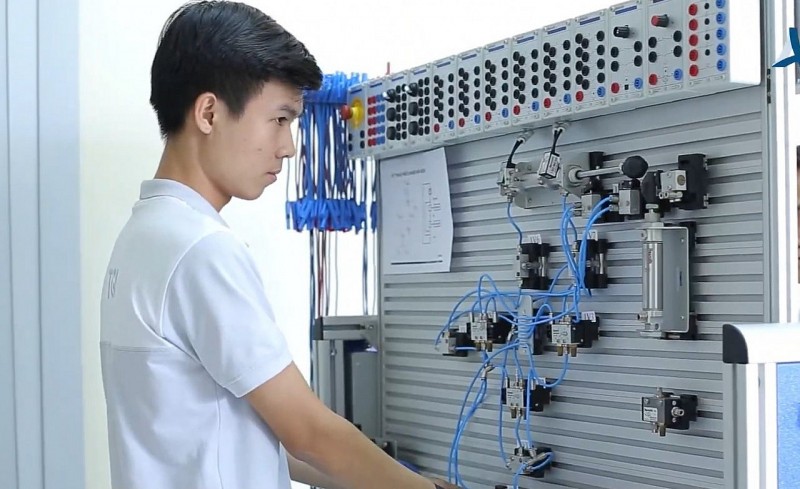
EVFTA help to lift Vietnam-Germany trade to 20 billion Euros in next 2-3 years: AHK Chief representative
Latest
 |
| Marko Walde, Chief representative of the Delegation of German Industry and Commerce in Vietnam. (Photo courtesy: AHK Vietnam) |
EVFTA is the driving force for Vietnam-Germany relations
Vietnam is an agricultural country, with the asset of exporting agricultural products and tropical fruits. How do you evaluate the opportunity for Vietnamese agricultural products to access the German market through German businesses in Vietnam?
This is one of my favorite topics and a mission that I have been always pursuing even when I am no longer holding this position in Vietnam.
However, in order for Vietnamese agricultural products to be more available in the German market, changes must be made.
Vietnam's agricultural sector is still export-oriented with large quantity. Vietnam is currently one of the world's leading coffee producers, and Germany is also one of the largest clients which import coffee from Vietnam, but surprisingly, no one knows about it in Germany.
I personally feel very regretful that in Germany, it is almost difficult to find a coffee product with Vietnamese origin.
This shows that the potential for both sides is huge. Vietnam should aim to not only export raw materials and raw agricultural products, but also find ways to develop a processing industry that can serve exports to increase added value for Vietnamese agricultural products.
The EVFTA is being implemented and creates a strong impetus for trade between Vietnam and the European Union (EU). So, how has Vietnam-Germany trade progressed thanks to the EVFTA push? How have German businesses taken advantage of this Agreement to promote exports to the Vietnamese market?
Over the past decade, bilateral trade in goods between the two countries has quadrupled, and Germany is Vietnam's largest EU trading partner with a trade volume of EUR 14.4 billion in 2021.
With the impetus from the EVFTA Agreement, the German Chamber of Commerce and Industry expects the Vietnam-Germany trade volume to reach about EUR 20 billion within the next two to three years.
In the context of increased protectionism, the German economy is export-oriented, so we need an open export market, based on a common international code system.
Since Vietnam and Germany are on the same "expressway", we will be more united in our views. We also have a good political relationship and economic cooperation, therefore we would also develop in tandem.
In addition, the EVFTA Agreement also helps reduce tariffs and significant technical barriers for the two countries' commodities when entering each other's markets.
Increasing FDI flows from Germany
Currently, German FDI in Asia concentrates a lot on China and mainly on technology transfer projects. Can you have an assessment about the investment areas that German businesses can deploy in Vietnam?
The sustainable strength of the German economy lies mainly in small and medium enterprises, not multinational corporations such as BOSCH, Mercedes Benz...
The German economy is also an export dependent economy so we also want to focus more on investment.
So where do German businesses usually make investment? Usually, they are quite risk averse, so many businesses scrutinize their investments in Asia due to the remote geographical distance.
Previously, most German businesses chose to invest in Eastern Europe due to geographical proximity. German enterprises are also limited in capacity and resources, so they often choose large markets, typically China, to invest.
However, now, German businesses are more interested in Vietnam. With the "China+1 Strategy", these enterprises are pursuing a plan to allocate and diversify the locations for investment.
Some businesses choose Bangladesh, Srilanka or India, but up to 95% of businesses look to Southeast Asia, of which Thailand and Vietnam are two important targets.
 |
| German enterprises can invest in Vietnam with 100% foreign capital. (Photo: AHK Vietnam) |
Vietnam is attractive to German businesses because Vietnam has a very important position in the flow of international trade. Out of 10 ASEAN countries, only 4 countries participate in the Comprehensive and Progressive Agreement for Trans-Pacific Partnership (CPTPP), including Vietnam, and only 2 countries have FTAs with the EU, Singapore and Vietnam.
Vietnam has advantages for investment in production. German enterprises can invest in Vietnam with 100% foreign capital, therefore can own 100%. The Vietnamese workers are very proactive in learning.
We can take it for granted that there is a close socio-economic connection between Germany and Vietnam, especially the East German countries. This has built up the Vietnam-Germany Strategic Partnership.
German businesses often choose Thailand because it has more developed auxiliary industries than Vietnam? What recommendations do you have for Vietnam to increase its competitiveness and become more attractive to German businesses?
In my opinion, Thailand has an advantage over other Southeast Asian countries in a very developed auxiliary industry. When we support several potential German companies to invest in this area, they request that 50% of their supply partners should come from the country where they want to make investment in.
Meanwhile, Japanese or Korean companies make considerable investment in Vietnam because their localization standards are different from German companies. To reverse this situation, Vietnam needs to improve the capacity of the auxiliary industry, the capacity to supply international- standard inputs.
Otherwise, do Vietnamese suppliers have any opportunities for investment in the German market and what are the standards to be met?
The German market is always open to Vietnamese businesses. Of course, to be successful in Germany or any other market, businesses need to learn about the country, its laws, its business culture, etc.
Thank you, Sir!





















